10 Best Wood Routers – Reviews & Buying Guide
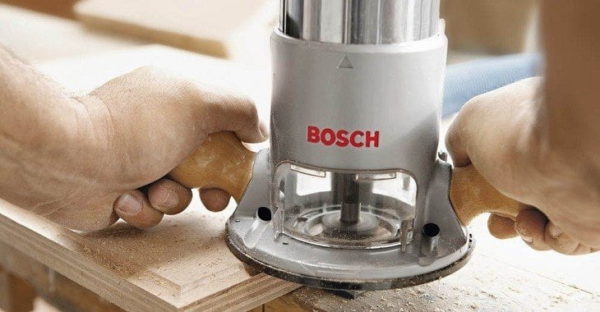
The router probably only comes second to the table saw when it comes to the most versatile and quintessential tools in a woodworker's workshop.
With the best wood routers, you can shape wood edges, make intricate designs, create joints, hollow out grooves and do a lot more.
However, wood routers come in several types and from various brands and they tend to differ a lot when it comes to factors like the versatility, ease of use and efficiency. And so as you are shopping for one to add to your tool collection, it is vital to have enough information.
Unless you are planning to buy more than one wood router, the chances are you will have to pick between several of these brands and types at some point.
But, whether you a professional with many years of experience or an inexperienced hobbyist, our in-depth guide below will provide all the information you need to pick the best wood router.
You can also read other product reviews such as router bit, router lift, router table. If you want to read product reviews in detail, here are some reviews that I recommend to read like Bosch PR20EVSK, Bosch 1617EVS, Porter-Cable 7518, Makita RT0701C, DeWalt DW618PK, DeWalt DWP611PK, Bosch 1617EVSPK.
10 Best Wood Routers - Reviews
A good wood router will have an immense effect on how you do things in the workshop. In our comparison table below we compare 10 top rated wood routers using factors like power, speed, and size to help you get closer to finding that good router for your workshop.
Image | Product Name | Power | Speed - RPM | Size | Rating | Current Price |
|---|---|---|---|---|---|---|
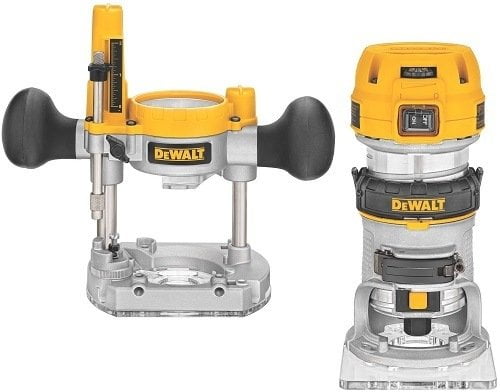 | 1. DeWalt DWP611PK Compact Router Combo Kit | 1.25 HP | 16,000-27,000 | Palm | 4.6 | |
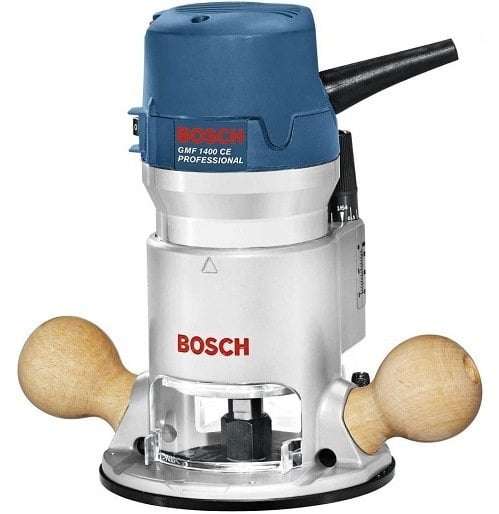 | 2. Bosch 1617EVS Variable-Speed Router | 2.25 HP | 8,000-25,000 | Mid-Size | 4.5 | |
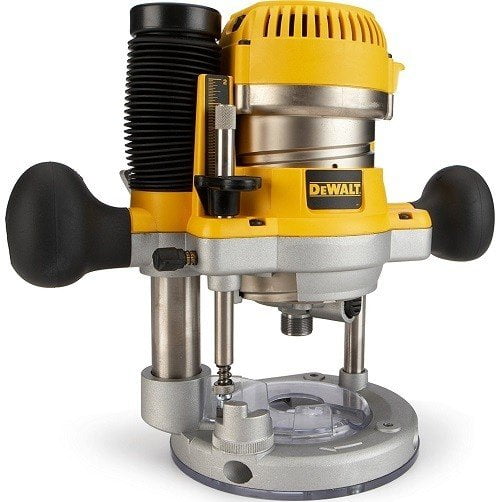 | 3. DeWalt DW618PK Plunge and Fixed-Base Router Kit | 2.25 HP | 8,000-24,000 | Mid-Size | 4.2 | |
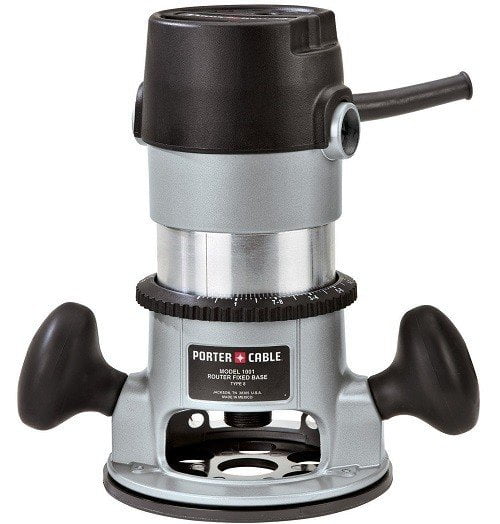 | 4. Porter-Cable 690LR 11-Amp Fixed-Base Router | 1-3/4 HP | 27,500 | Mid-Size | 4.6 | |
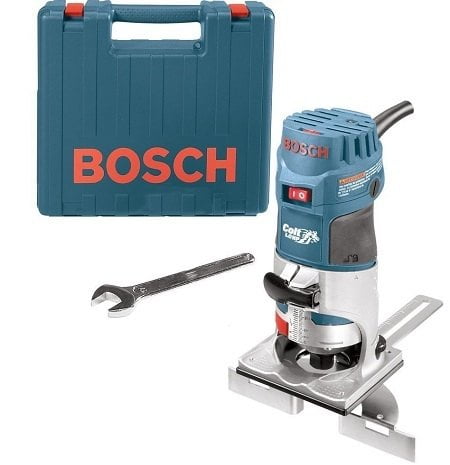 | 5. Bosch PR20EVSK Colt Variable-Speed Router | 1.0 HP | 15,000-35,000 | Palm | 4.2 | |
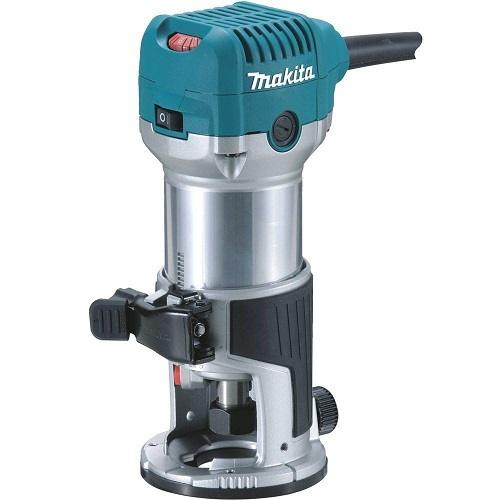 | 6. Makita RT0701C Compact Router | 1-1/4 HP | 10,000-30,000 | Palm | 4.6 | |
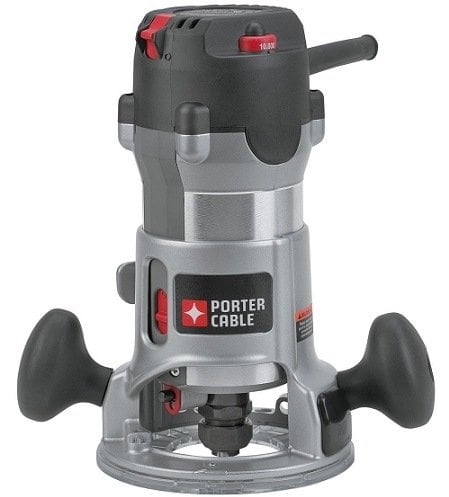 | 7. Porter-Cable 892 Router | 2-1/4 HP | 10,000-23,000 | Mid-Size | 4.4 | |
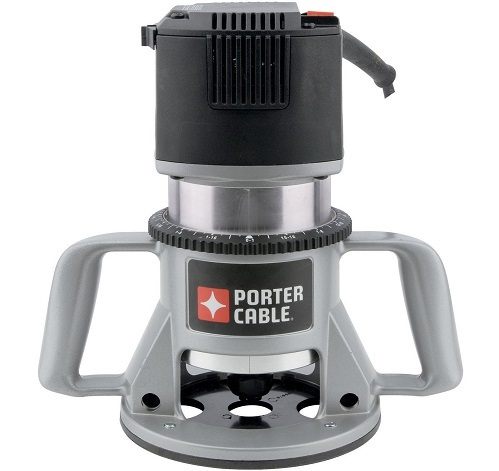 | 8. Porter-Cable 7518 Fixed Base 5-Speed Router | 3-1/4 HP | 10,000-21,000 | Full-Size | 4.3 | |
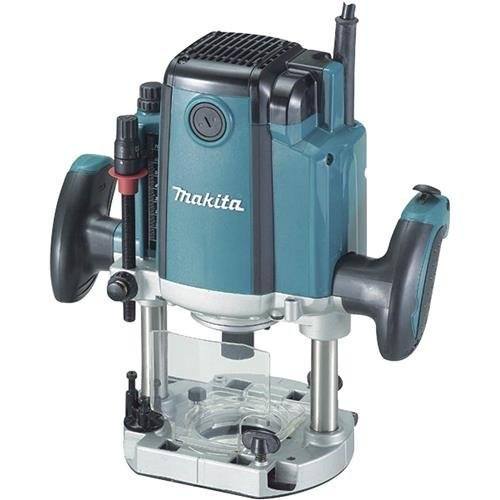 | 9. Makita RP1800 Plunge Router | 3-1/4 HP | 22,000 | Full-Size | 4.5 | |
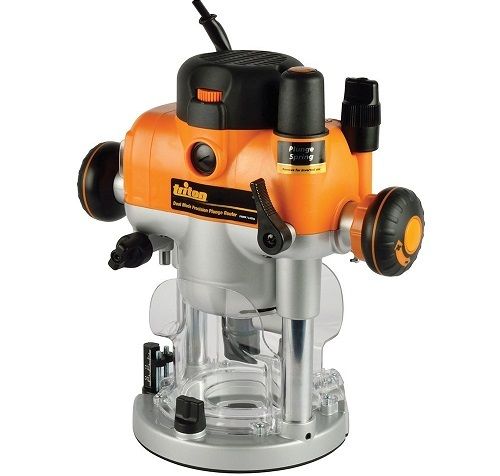 | 10. Triton TRA001 Dual Mode Precision Plunge Router | 3-1/4 HP | 8,000-21,000 | Full-Size | 4.3 |
#1. DeWalt DWP611PK 1.25 HP Variable Speed Compact Router Combo Kit
Editor's Rating:  (4.6 / 5)
(4.6 / 5)

- Power: 1.25 HP
- Speed: 16,000-27,000 RPM
- Size: Palm
For a router combo kit, the DeWalt DWP611PK is quite affordable and it will be great to have in the workshop as it can do any routing task.
The 1.25 HP soft starting motor uses a full-time electronic feedback mechanism that will maintain the motor speed throughout the cut. And it will deliver a variable speed of between 16,000 and 27,000 RPM.
With this small wood router, you can always be confident of maximum visibility of the workpiece when in operation thanks to the dual LED and clear sub-base.
Changing the bits is also quick and easy as it has multiple shaft-lock detents and the low-pressure spindle lock that ensures that you only use one wrench when doing it.
The over-molded rubber handle makes this wood router comfortable to operate while the aluminum motor housing ensures it will serve you for many years. And changing between the fixed and plunge base is also quick and easy.
Pros:
Cons:
[su_asin asin="B0049ZFUK2"]
#2. Bosch 1617EVS 2-1/4 HP Variable Speed Wood Router
Editor's Rating:  (4.5 / 5)
(4.5 / 5)

- Power: 2.25 HP
- Speed: 8,000-25,000 RPM
- Size: Mid-Size
The powerful 2-1/4 HP motor makes the Bosch 1617EVS one of the best fixed base routers out there, and it is also a versatile power tool thanks to the variable speed that ranges between 8,000 and 25,000 RPM.
With the advanced speed control technology on this fixed base router, you can be confident of consistent speeds throughout the cut.
The rounded hardwood handles on the base maximize user control and also make this router comfortable to operate while the rugged aluminum base makes it a highly durable power tool.
Other features like the completely dust-sealed power switch, 1/2 and 1/4-inch self-releasing collets and the fact that it comes with all the mounting hardware also help to make this an outstanding mid-size router.
Pros:
Cons:
[su_asin asin="B00004TKHV"]
#3. DeWalt DW618PK 2-1/4 HP Plunge & Fixed-Base Variable Speed Router Kit
Editor's Rating:  (4.2 / 5)
(4.2 / 5)

- Power: 2.25 HP
- Speed: 8,000-24,000 RPM
- Size: Mid-Size
A combo kit is the best option for woodworkers that do a lot of routing, and if is a top notch one like the DeWalt DW618PK, you can be confident of having a reliable tool for all your routing needs.
The mid-size router runs on a 2-1/4 HP motor and with a variable speed of between 8,000 and 24,000 RPM for increased versatility.
This DeWalt wood router comes with a spindle lock button to make single wrench bit changes possible and a clear sub-base for increased bit visibility and durability.
Also, it has some comfortable rubber overmold handles and a dust-sealed switch for longer service life.
Pros:
Cons:
[su_asin asin="B00006JKXE"]
#4. Porter-Cable 690LR 11-Amp Fixed-Base Router
Editor's Rating:  (4.6 / 5)
(4.6 / 5)

- Power: 1-3/4 HP
- Speed: 27,500 RPM
- Size: Mid-Size
If you are working on a task that requires high speeds, this Porter Cable router will be a good choice. Despite being a single speed router it delivers a speed of 27,500 RPM which is one if the highest on our wood router reviews.
It uses a cam lock lever for simple coarse height adjustment and it also has a precision machined aluminum housing and base for durability.
The auto release collet system makes bit removal easy after use, and the wood router comes with both 1/4 and 1/2-shank bit collects to ensure you can use all kinds of bits.
There is also an under table stop that will prevent the motor from rotating out of the base and some overmold grips that provide greater comfort when using the router for extended periods.
Pros:
Cons:
[su_asin asin="B00005QEVQ"]
#5. Bosch PR20EVSK Colt Palm Grip 1HP Fixed-Base Variable Speed Router
Editor's Rating:  (4.2 / 5)
(4.2 / 5)

- Power: 1 HP
- Speed: 15,000-35,000 RPM
- Size: Palm
This Bosch wood router has one of the smallest motors on our list that operates at only 1 HP it might not be very powerful but it makes this a compact and lightweight router that is easy to operate with one hand.
The soft start motor makes this one of the best compact wood routers out there as it means it is safer and more convenient to use.
This user-friendly router will accept 1/4-inch bits and also comes with a front spindle lock that allows for one-wrench bit changes.
Also, the wood router delivers a variable speed of between 15,000 and 35,000 RPM which means it has the highest top speed on our list. And with the conveniently placed speed dials, adjusting the speeds should be quick and easy.
Pros:
Cons:
[su_asin asin="B000ANQHTA"]
#6. Makita RT0701C 1-1/4 HP Compact Router
Editor's Rating:  (4.6 / 5)
(4.6 / 5)

- Power: 1-1/4 HP
- Speed: 10,000-30,000 RPM
- Size: Palm
Makita RT0701C is a compact and variable speed wood router that delivers speeds of between 10,000 and 30,000 RPM to make it a highly versatile power tool.
You also get to maintain constant speed under load for consistent results thanks to the electronic speed control and there is also a soft start feature for smooth router startups.
The high visibility base design makes it easy to see your work to improve handling and performance, and you can also remove the base easily when you want to change it to plunge or tilt.
This wood router also has a shaft lock to make bit changing quick and easy and a durable aluminum motor housing to make is a long-lasting tool.
The impressive performance and relatively affordable price tag combine to make this one of the best budget wood routers.
Pros:
Cons:
[su_asin asin="B00E7D3V4S"]
#7. Porter-Cable 892 2-1/4-Horsepower Router
Editor's Rating:  (4.4 / 5)
(4.4 / 5)

- Power: 2-1/4 HP
- Speed: 10,000-23,000 RPM
- Size: Mid-Size
If you are on the lookout for the best wood router under 200 dollars, the Porter-Cable 892 will be an excellent choice. And like most other top-notch wood routers, it comes with soft start feature for smooth startups.
The variable speed control feature allows you to choose a speed that suits your particular applications with speeds that range between 10,000 and 23,000 RPM.
With the dual-position switch on this router, you can cut power while still maintaining control over the tool. And it also has a spindle lock for single wrench bit changes and overmolded grips for comfort even when using the wood router for extended periods.
Pros:
Cons:
[su_asin asin="B0000DCBK0"]
#8. Porter-Cable 7518 3-1/4 HP Fixed Base 5-Speed Router
Editor's Rating:  (4.3 / 5)
(4.3 / 5)

- Power: 3-1/4 HP
- Speed: 10,000-21,000 RPM
- Size: Full-Size
A full-size wood router like this one is the workhorse that you need for your heavy-duty routing tasks, and it is just what a professional woodworker needs to have in the workshop.
It runs on a powerful 3-1/4 horsepower that will deliver more than enough power for any routing task that you might want to accomplish. And it also has the convenient soft start feature.
This five-speed router will work with various router bit cutting diameters and for various applications. And it also has an auto-release collet system that makes the bits easy to remove after use.
The sealed ball-bearing design ensures that no dust gets to the essential components to increase their lifespan while the precision-machined aluminum housing for the motor ensures that it can withstand rough job sites to provide long-lasting service
Pros:
Cons:
[su_asin asin="B0000222V3"]
#9. Makita RP1800 3-1/4 HP Plunge Router
Editor's Rating:  (4.5 / 5)
(4.5 / 5)

- Power: 3-1/4 HP
- Speed: 22,000 RPM
- Size: Full-Size
Here is another highly powerful 3-1/4 HP wood router that will be a great addition to your workshop if you prefer a large wood router for heavy duty tasks.
It has a relatively higher plunge depth capacity (0 to 2-3/4 inches) that makes it easy for the tool to penetrate the workpiece. And it also has micro control and preset depth stops for quick adjustment of the plunge depth.
The wood router comes with linear ball bearings for smooth plunge action and to provide a superior overall performance.
The shaft lock makes bit changes quick and easy while the oversize ball bearing construction makes the tool long lasting and ergonomic rubberized handles make it comfortable to operate for extended periods.
Pros:
Cons:
[su_asin asin="B002MUAMFE"]
#10. Triton TRA001 3-1/4 HP Dual Mode Precision Plunge Router
Editor's Rating:  (4.3 / 5)
(4.3 / 5)

- Power: 3-1/4 HP
- Speed: 8,000-21,000 RPM
- Size: Full-Size
With a large and powerful wood router like the 3-1/4 HP Triton TRA001, there is almost no routing task that will be too much for you.
The soft start ensures that the wood router always starts smoothly with no sudden surges and it also has a variable speed feature with a range of between 8,000 and 21,000 RPM.
The automatic spindle lock makes it possible to change the bits using one wrench, and there is also an auto shaft lock that makes bit change fast and easy.
And the Triton wood router also has a micro winder for fine depth adjustments and also to allow for through-table adjustment when using the router for fixed applications.
Pros:
Cons:
[su_asin asin="B00779ND0Q"]
Types of Wood Router
As you shop for a wood router to add to your workshop, one of the first decisions that you will have to make is the type to buy.
Overall, there are three types of wood routers which are fixed base, plunge base, and combination base. Knowing what each is all about and their advantages and disadvantages will make it easier to pick one among them.
1. Fixed Base Router
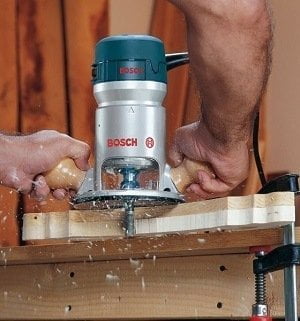
If you are just starting out in woodworking or are buying your first router, the fixed base wood router is a great option for you as it is relatively easier to use than the other types.
It is the type that will require you to set the cut depth you want before you start cutting, and as its name suggests this depth remains fixed throughout the cut. Unlike the plunge base router, you cannot change the depth while making the cut.
And since the handles on the fixed base router are close to the bottom of the base, fixed base routers have a low center of gravity. This makes it hard to plunge into your workpiece.
These routers will be ideal for woodworking projects that require straight line accuracies, and they are often best suited for hobbyists and casual woodworkers or DIYers.
Pros:
Cons:
2. Plunge Base Router
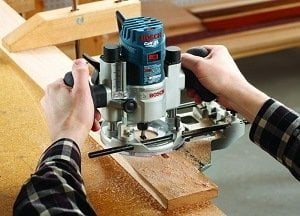
The plunge base router is a much more flexible and versatile option that tries to make up for some of the shortcomings of the fixed base wood router.
Unlike the fixed base, you do not have to preset the depth before making the cut as you can tweak it during the cut. And you do not need to turn it off to make the depth adjustments.
With the plunge base router, the handles and motor are higher up than the fixed base and this means that it has a higher center of gravity which allows woodworkers to plunge into the workpiece easily.
However, this design also means that plunge routers can feel a little unstable and will require more finesse to use effectively.
These routers are ideal for cutting grooves, mortises, stopped dados and even incised letters, and they are best suited for professional and seasoned woodworkers.
Pros:
Cons:
Read More: Plunge Router vs. Fixed Router
3. Combination Base Router
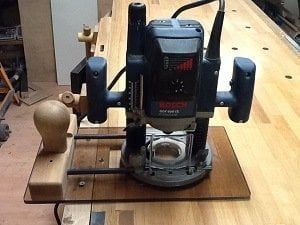
The combination base router is purposely designed to give you the best of both fixed and plunge routers without having to buy the two tools separately.
With this 2-in-one router, all you need to do is to remove the engine from one base to the other to enjoy the services of the router that you want.
The only shortcomings with a combination base router are that you will need to change the bases often if you are using both fixed and plunge router for your projects, and it also takes more time to get used to.
There is almost nothing that a router does that you cannot do with the combination router from softening edges to making dovetail and rabbets. But it is better suited for a woodworker with some experience.
Pros:
Cons:
How to Buy the Best Wood Routers
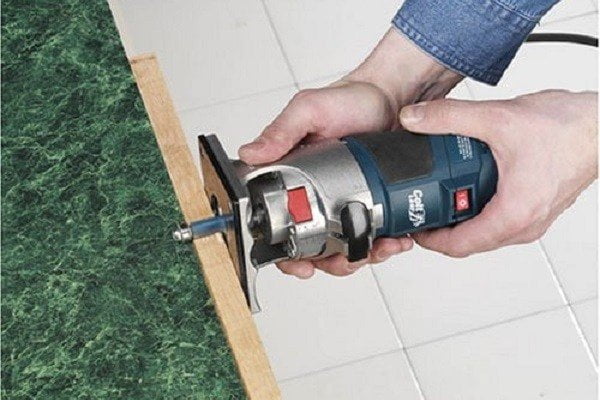
Choosing one router from the many models out there, which are also from very reputable brands, is not an easy task.
Although knowing the different types and what they can dot will help narrow down your choices, it is still vital to consider the following points before making up your mind.
#1. Size
Regardless of whether you prefer to use the more affordable fixed base router or the more versatile plunge base router, you will still need to decide the size you want.
When it comes to the router size, you will mostly have to choose between palm, mid-size and full-size routers.
1. Palm/Trim Routers
If you prefer a wood router that you can manipulate easily and use with one hand the palm or trim router is the best choice.
These small and compact routers run on a 1 or 1.5 HP motor and despite their size, they are still capable of working on relatively large workpieces.
Trim wood routers can also be quite versatile and you can use them for various applications such as edge forming, hinge mortising, trimming and small-scale dovetailing tasks. And most will use the 1/4-inch shank bits.
2. Mid-Size Routers
The mid-size wood router will have engines that are between 1-3/4 and 2-1/4 HP and they are the most popular size due to their versatility.
They will come with either a fixed or plunge base and they will require two hands for operation. Besides from doing everything that you can do with the palm wood router, they will also be ideal for other applications such as panel cutting and large-scale dovetailing.
Mid-size routers will work well with heavier milling and often accept both 1/4 and 1/2-inch shank bits.
3. Full-Size/Large Routers
For seasoned woodworkers that are looking for a workhorse when it comes to routers, the full-size or the large wood router is the best choice among the three types. And they are mostly designed for use in production.
Full-size routers will have an engine of up to 3 HP and since they are larger and heavier, they will in most instances be used from a dedicated router table.
They will do everything that a combination router can do but their weight and size means that they are too cumbersome for everyday handheld use. These routers are also not ideal for inexperienced hobbyists and beginners.
#2. Speed
Speed is probably one of the things that will be on top of the mind when shopping for the best wood router because every woodworker is always looking for a tool that does the job fast.
But when it comes to wood routers, getting something with a variable speed is more important than going for a unit that can attain high speeds.
Variable speed wood routers are more versatile and they give you more control over the task so that you always get superior results.
Also, variable speed allows you to make adjustments depending on the bits you are using. Smaller bits require high speeds to cut cleanly while the large ones work best and safely at slower speeds.
#3. Router Bits
The router might be what generates all the power and speed but the router bits are what will do the actual job as they are the part of the router that is in contact with the workpiece.
Without bits, a router will be a useless tool but it is still important to make sure that you choose the right ones for your particular tasks or applications.
Some of the most common bits are straight, chamfer, edge, rabbeting, dado, dovetail, beading round nose and V-groove.
When it comes to router bits, the more you have the better as it also means the more you can use the tool for but also make sure they are high quality enough and will not dull or break after a few uses.
#4. Other Features
There are some extra features that might not be essential for the functioning of a wood router and will also not be available in all models but they are always great to have in your router. And they include the following three
- Soft Start- Soft start ensures that the motor does not jerk the router and instead accelerates gently to the speed that you preset. And this helps to make the tool safer to use.
- Spindle Lock- With spindle lock you will not need two wrenches to change bits. You only need to push the spring-loaded pin or engage the locking collar to keep the motor shaft in place and change the bits.
- Dust Collection- A dust collection feature helps you to manage all the wood dust that routing produces so that you can keep your workshop clean and prevent health problems.
#5. Warranty
You cannot always be sure how a particular router will perform or whether it will last long or not if you have not used it before.
The only thing that can give you some kind of assurance of the quality of the wood router is the warranty. And so it is always important to make sure that whatever brand and model you pick comes with a warranty.
Although the length of warranty varies from one company to the other, a good wood router will be backed by at least a 2-year warranty.
Conclusion
A wood router is one of those tools that you will end up using for almost all your projects, and so it is always vital to make sure that you choose the best one from the myriad of options.
Choosing a top rated wood router will first require you to understand the different types and their merits and demerits.
And if you also consider other factors like router size, speed, and power it should be more straightforward for you to pick a good wood router to add to your workshop.
Once you get the best wood router it is also important to make sure that you pick the right router bits and also inspect and maintain the tool often enough.
Last Updated on August 15, 2020 by
